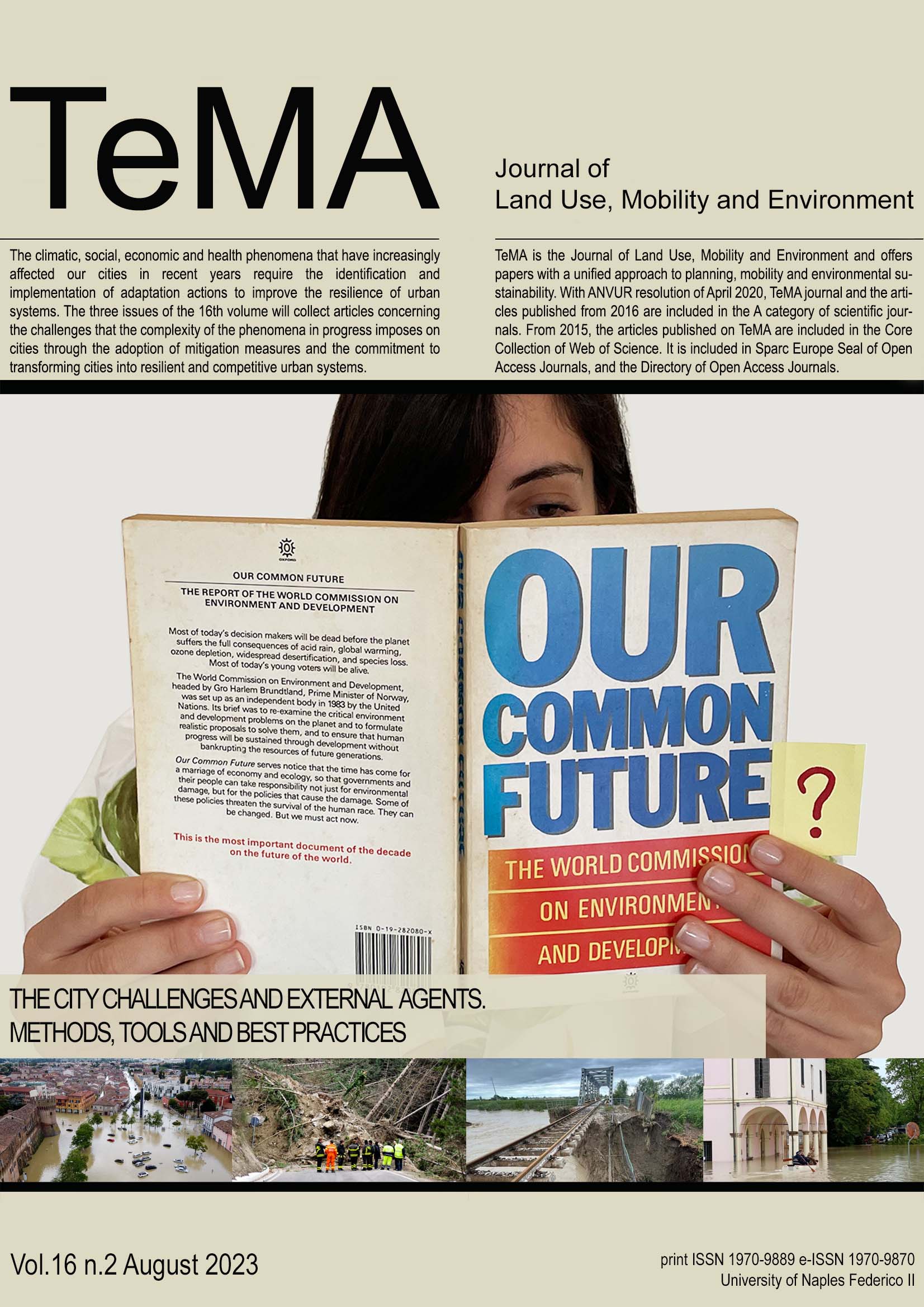Energy transition: pinning down the gaps between theory and practice
DOI:
https://doi.org/10.6093/1970-9870/10041Keywords:
Urban Energy Planning, Energy transition, Spatial Energy PlanningAbstract
Starting from the relationship between urban planning and mobility management, TeMA has gradually expanded the view of the covered topics, always remaining in the groove of rigorous scientific in-depth analysis. This section of the Journal, Review Notes, is the expression of continuously updating emerging topics concerning relationships between urban planning, mobility and environment, through a collection of short scientific papers written by young researchers. The Review Notes are made of five parts. Each section examines a specific aspect of the broader information storage within the main interests of TeMA Journal. In particular, the Methods, tools and data for the city energy governance section focuses on the challenges that urban energy planning commonly faces, providing food for thought to readers and fellow researchers. This contribution aims at examining these challenges and the solutions proposed in the scientific literature. For the second issue of TeMA Journal volume no. 16, this section is dedicated at identifying the gaps between the theoretical scientific progress and their actual practical implementation.
Downloads
References
Cajot, S., Peter, M., Bahu, J. M., Guignet, F., Koch, A., & Maréchal, F. (2017). Obstacles in energy planning at the urban scale. Sustainable cities and society, 30, 223-236. https://doi.org/10.1016/j.scs.2017.02.003
Carpentieri, G., Guida, C., & Sgambati, S. (2023). Textometric analysis on the ongoing academic spatial planning debate. TeMA. Journal of Land Use, Mobility and Environment, 197-223. https://doi.org/10.6093/1970-9870/9782
Carpentieri G., Guida C., Fevola O., & Sgambati S. (2020). The Covid-19 pandemic from the elderly perspective in urban areas: An evaluation of urban green areas in 10 European capitals. TeMA. Journal of Land Use, Mobility and Environment, 13(3), 389-408. https://doi.org/10.6092/1970-9870/7007
de Almeida Collaço, F. M., Simoes, S. G., Dias, L. P., Duic, N., Seixas, J., & Bermann, C. (2019). The dawn of urban energy planning–Synergies between energy and urban planning for São Paulo (Brazil) megacity. Journal of cleaner production, 215, 458-479. https://doi.org/10.1016/j.jclepro.2019.01.013
De Pascali, P., & Bagaini, A. (2018). Energy transition and urban planning for local development. A critical review of the evolution of integrated spatial and energy planning. Energies, 12(1), 35. https://doi.org/10.3390/en12010035
Guida C. (2022). Energy saving and efficiency in urban environments: integration strategies and best practices. TeMA. Journal of Land Use, Mobility and Environment, 15(3), 517-531. https://doi.org/10.6093/1970-9870/9549
Gargiulo C., & Russo L. (2017). Cities and Energy Consumption: a Critical Review. TeMA. Journal of Land Use, Mobility and Environment, 10(3), 259-278. https://doi.org/10.6092/1970-9870/5182
Gargiulo, C. & Papa, R. (2021). Chaos and chaos: the city as a complex phenomenon. TeMA. Journal of Land Use, Mobility and Environment, 14 (2), 261-270. http://dx.doi.org/10.6092/1970-9870/8273
Gholami, M., Barbaresi, A., Torreggiani, D., & Tassinari, P. (2020). Upscaling of spatial energy planning, phases, methods, and techniques: A systematic review through meta-analysis. Renewable and Sustainable Energy Reviews, 132, 110036. https://doi.org/10.1016/j.rser.2020.110036
Grubler A., Bai X., Buettner T., Dhakal S., Fisk D.J, Ichinose T, Keirstead J.E., Sammer G., Satterthwaite D.,Schulz N.B., et al. (2012) Urban energy systems in Global Energy Assessment — Toward a Sustainable Future, Cambridge University Press and the International Institute for Applied Systems Analysis (2012) pp 1307–1400
IEA (2021), Empowering Cities for a Net Zero Future, IEA, Paris. Retrieved from: https://www.iea.org/reports/empowering-cities-for-a-net-zero-future, License: CC BY 4.0
Pilogallo A., Saganeiti L., Scorza F., & Murgante B. (2019). Ecosystem Services’ Based Impact Assessment for Low Carbon Transition Processes. TeMA. Journal of Land Use, Mobility and Environment, 12(2), 127-138. https://doi.org/10.6092/1970-9870/6117
Russo L. (2017). Cities and energy consumption: how to reduce CO2 emissions and address climate change. FedOA. http://dx.doi.org/10.6093/UNINA/FEDOA/11555
Stoeglehner, G.; Neugebauer, G.; Erker, S.; Narodoslawsky, M. (2016) Integrated Spatial and Energy Planning: Supporting Climate Protection and the Energy Turn with Means of Spatial Planning; Springer Nature. ISBN 3319318705.
Zanon, B., & Verones, S. (2013). Climate change, urban energy and planning practices: Italian experiences of innovation in land management tools. Land use policy, 32, 343-355. https://doi.org/10.1016/j.landusepol.2012.11.009
World Bank (2023), World Bank Open Data. Retrieved from https://data.worldbank.org/
Downloads
Published
How to Cite
Issue
Section
License
Authors who publish in this journal agree to the following:
1. Authors retain the rights to their work and give in to the journal the right of first publication of the work simultaneously licensed under a Creative Commons License - Attribution that allows others to share the work indicating the authorship and the initial publication in this journal.
2. Authors can adhere to other agreements of non-exclusive license for the distribution of the published version of the work (ex. To deposit it in an institutional repository or to publish it in a monography), provided to indicate that the document was first published in this journal.
3. Authors can distribute their work online (ex. In institutional repositories or in their website) prior to and during the submission process, as it can lead to productive exchanges and it can increase the quotations of the published work (See The Effect of Open Access)


